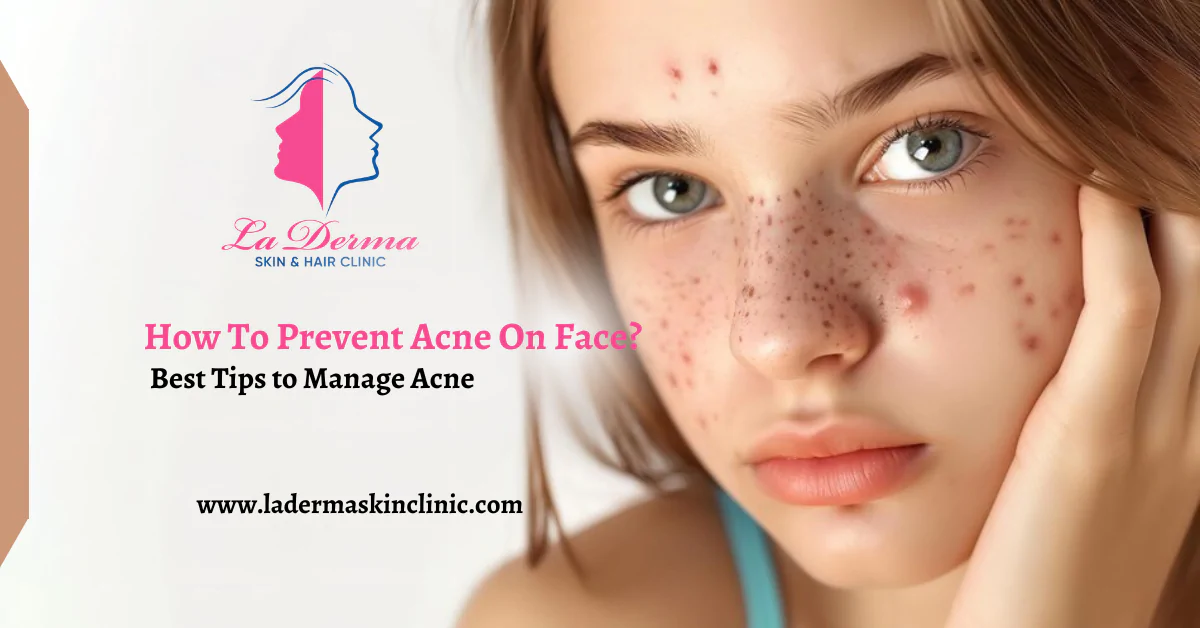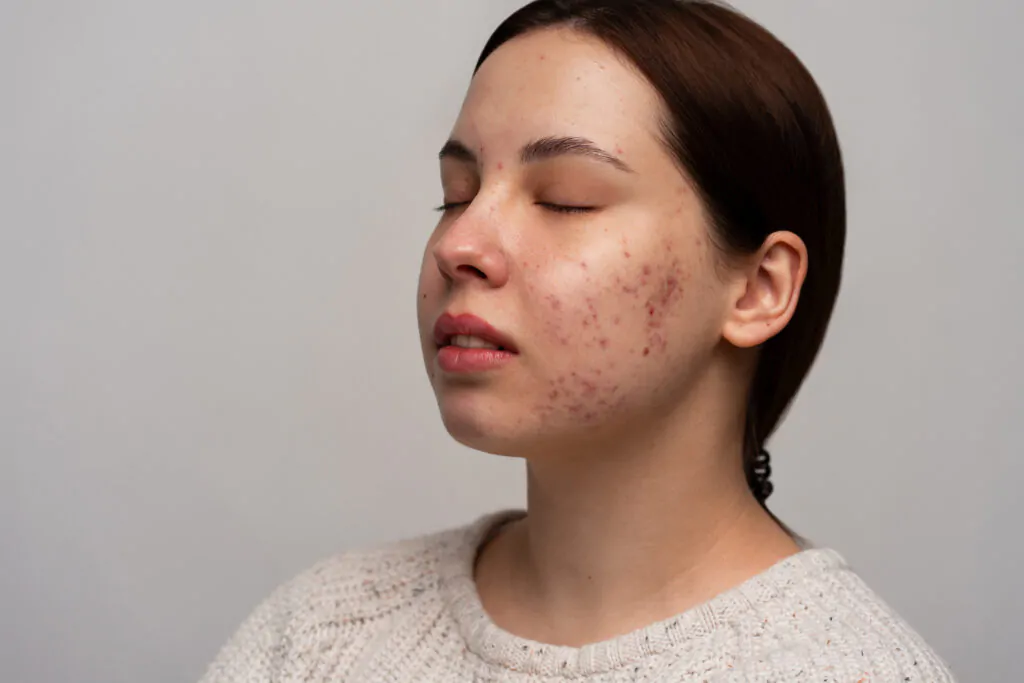
How To Prevent Acne On Face: Best Tips to Manage Acne
How To Prevent Acne On Face: Are pesky breakouts becoming a regular occurrence for you? Are you finding that your go-to beauty fixes, DIY remedies, or trendy acne treatments just aren’t cutting it? Don’t fret just yet!
Delve into this article to uncover the root causes of acne and learn some incredibly easy yet highly effective beauty tips endorsed by top dermatologists in Kolkata, guaranteed to keep those pimples at bay!
Why Do You Get Acne?
Acne develops when our skin pores become clogged with an excess of oil, dirt, dead cells, and bacteria. While puberty often sparks increased sebum production leading to teenage acne, adults can also experience it well into their 40s due to hormonal shifts linked to pregnancy, menopause, conditions like PCOS and insulin resistance, stress, medication side effects, and poor lifestyle choices. A family history of acne can heighten susceptibility.

Both men and women are affected by acne, manifesting in various forms such as whiteheads, blackheads, red bumps, papules, pustules, nodules, and cysts, depending on its severity. Untreated acne poses risks of recurrence, worsening, pigmentation issues, and scarring. Understanding the root causes of acne underscores the importance of exploring potential dietary influences on its management.
Best Diet For Clear And Healthy Skin
The internet is awash with conflicting information regarding the relationship between acne and diet. Nevertheless, here are some dietary suggestions that may aid in managing acne-prone skin:
- Incorporate foods with a low glycemic index into your diet, such as whole grains, legumes, fresh fruits, and vegetables.
- Boost your intake of zinc-rich foods like pumpkin seeds, cashews, beef, turkey, quinoa, lentils, and seafood to enhance skin health.
- Include essential nutrient-rich foods like Vitamin A and E sources such as toasted almonds, sunflower seeds, almond butter, and peanut butter to bolster the skin’s healing response.
- Prior to altering your dietary habits, it’s advisable to seek advice from a dermatologist. However, you can also explore effective skincare tips to help prevent acne.
How To Prevent Acne On Face?
Even top dermatologists endorse the following beauty tips for effectively preventing breakouts:
- Maintain Hygiene: Keeping your face clean by washing away excess oil, dirt, and sweat twice a day can go a long way in preventing acne. Use a gentle face wash suited to your skin type, often the primary choice for acne treatment.
- Know Your Skin Type: Understanding your skin type is crucial, yet many of us overlook it, leading to improper skincare routines that don’t address our skin’s specific needs.
- Stick to a Skincare Routine: Establish a consistent skincare regimen involving cleansing, moisturizing, and daily sunscreen application.
- Prioritize Bedtime Skincare: Before bed, ensure you remove all makeup and apply a suitable moisturizer to keep your skin hydrated.
- Choose the Right Products: Opt for skincare products tailored to your skin type. For acne-prone skin, select non-comedogenic, water-based, or gel-based products recommended by your dermatologist.
- Avoid Over-Scrubbing: Harsh exfoliation and aggressive scrubbing can worsen inflammation and exacerbate acne. Gentle skincare practices are key to maintaining skin health.
- Resist Popping Pimples: Despite the temptation, refrain from popping pimples as it can result in lasting marks and scars, worsening the situation.
- Seek Early Professional Advice: Any level of acne has the potential to worsen and cause permanent damage. Consulting with a skin clinic at La Derma at the onset of a breakout can help prevent future occurrences and mitigate risks of scarring.
- Be Patient: While expecting immediate results from medical treatments is common, it’s important to understand that visible improvements take time. Adhering to your doctor’s recommendations diligently yields the best outcomes.
- Stay Hydrated: Increase your water intake to flush toxins from your skin and prevent pore blockages.
Advanced Acne Treatment Methods at La Derma Skin Clinic For How To Prevent Acne On Face?
Acne often proves to be a persistent issue, potentially leading to scarring and blemishes. When seeking professional assistance, the primary goal is typically achieving noticeable results. Therefore, leading dermatologists frequently recommend advanced aesthetic procedures to aid in achieving clear skin:
1. Chemical Peels
These peels designed for acne control work by eliminating dead cells and unveiling rejuvenated skin beneath. Skilled practitioners administer controlled exfoliation to
minimize breakouts.
2. Laser Treatment for Face
The medical experts at La Derma might recommend a series of laser toning sessions as a supplementary treatment to diminish post-inflammatory hyperpigmentation resulting from acne. This approach can result in a noticeable enhancement of your skin tone and the reduction of blemishes left behind by active acne.
3. LED Treatment
LED treatment for acne, also known as Light Emitting Diode therapy, is a non-invasive skincare procedure used to target and reduce acne and pimples. This treatment involves the use of specific wavelengths of light to stimulate and rejuvenate the skin.
4. Derma pen 4 Micro Needling
It is very effective in reducing between active acne and acne scars. Derma pen 4 is the most advanced Micro needling tool available in India.
5. Acne Extractions
This treatment involves the use of specialized tools by your skincare expert to safely extract whiteheads and blackheads, leaving you with blemish-free and smooth skin.
Also Read:
Why Opt for La Derma Skin Clinic for Acne Treatment? | How To Prevent Acne On Face?
Opting for La Derma Skin Clinic for acne treatment can be a wise choice for several reasons. Here are some key points to consider:
- Expertise: La Derma Skin Clinic specializes in dermatological care, including acne treatment. Their team likely consists of experienced dermatologists and skincare professionals who understand the complexities of acne and how to effectively treat it.
- Personalized Treatment Plans: Acne can vary widely from person to person, so a one-size-fits-all approach may not be effective. At La Derma, you can expect personalized treatment plans tailored to your specific skin type, severity of acne, and any underlying conditions.
- Advanced Technologies: Leading skin clinics often invest in the latest technologies and treatments for optimal results. La Derma may offer advanced treatments such as laser therapy, chemical peels, or microdermabrasion to target acne and its scars effectively.
- Quality Products: In addition to in-clinic treatments, La Derma may recommend high-quality skincare products designed to manage acne and promote skin health. These products may be clinically tested and formulated with active ingredients proven to combat acne.
- Follow-up Care: Acne treatment is often a journey that requires ongoing care and adjustments. La Derma Skin Clinic may offer follow-up appointments to monitor your progress, make any necessary changes to your treatment plan, and provide guidance on skincare routines for long-term results.
- Positive Reputation: Researching reviews and testimonials from past clients can give you insight into the reputation of a skincare clinic. If La Derma has a history of satisfied customers and positive feedback regarding their acne treatments, it may indicate a reliable choice.
Overall, choosing La Derma Skin Clinic for acne treatment could offer you access to expert care, personalized treatment plans, advanced technologies, and ongoing support on your journey to clearer, healthier skin.
Also Read:
Frequently Asked Questions About How To Prevent Acne On Face
1. What causes acne?
Acne is primarily caused by excess oil production, clogged pores, bacteria, and inflammation. Hormonal changes, genetics, certain medications, and lifestyle factors can also contribute.
2. What are the different types of acne?
Acne can manifest as whiteheads, blackheads, papules, pustules, nodules, or cysts. Each type varies in severity and requires different treatment approaches.
3. How can I prevent acne breakouts?
Maintaining good skincare habits such as cleansing regularly, avoiding pore-clogging products, managing stress levels, and following a balanced diet can help prevent acne breakouts.
4. What over-the-counter treatments are effective for acne?
Over-the-counter treatments containing benzoyl peroxide, salicylic acid, or sulfur are often effective for mild to moderate acne. These ingredients help unclog pores, reduce inflammation, and kill bacteria.
5. When should I see a dermatologist for acne?
If over-the-counter treatments fail to improve your acne, or if you have severe or persistent acne, it’s advisable to see a dermatologist. They can prescribe stronger medications or recommend procedures tailored to your specific needs.
6. Are there any natural remedies for acne?
Some natural remedies like tea tree oil, aloe vera, green tea extract, and witch hazel may help reduce acne symptoms for some individuals. However, their effectiveness varies, and it’s essential to use them cautiously.
7. Can acne be treated with lifestyle changes?
Yes, certain lifestyle changes such as managing stress, exercising regularly, getting enough sleep, and maintaining a healthy diet can help improve acne symptoms by reducing inflammation and balancing hormone levels.
8. How long does it take for acne treatments to work?
The time it takes for acne treatments to work varies depending on the severity of the acne and the chosen treatment method. Some people may see improvement within a few weeks, while others may require several months of consistent treatment.
9. Are there any side effects associated with acne treatments?
Yes, some acne treatments, especially prescription medications like isotretinoin, oral antibiotics, and topical retinoids, can have side effects such as dryness, redness, irritation, and increased sun sensitivity. It’s essential to discuss potential side effects with your dermatologist before starting any treatment regimen.
Also Read:




